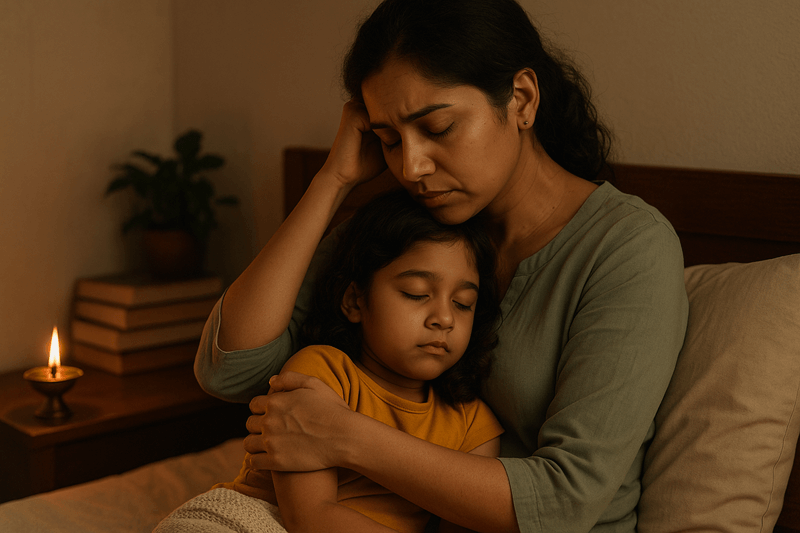A Heartfelt Vedic Reflection for Today’s Parents
Am I Messing This Up?” – The Silent Fear Every Parent Carries
There’s a moment — usually late at night — when the house is quiet, the lights are dim, and your child is finally asleep…
You lie there, staring at the ceiling, replaying the day.
“Did I shout too much today?”
“Why did I lose it over something so small?”
“They didn’t even eat properly… am I failing?”
If you’ve ever felt that sinking feeling in your chest — that quiet doubt, that invisible guilt — you’re not alone. We all carry it.
And yet, we rarely talk about it.
We scroll through perfect parenting posts, hear advice from every corner, and somewhere in the noise, we forget one thing: Parenting is not about being perfect. It’s about being present.
In this blog, I want to speak to that tender part of you.
Not the planner. Not the provider. But the soul behind the parent. The one who just wants to raise a happy, grounded child — and not lose themselves in the process.
Together, let’s explore the myths we’ve been fed, the pressures we carry, and the Vedic way — a way that brings us back to truth, simplicity, and connection.
This isn’t a lecture. It’s a remembering.
Of what parenting once was. And what it can still become.
Myth #1: “Good Parents Never Lose Patience”

Reality:
You’re human. Even the most spiritual sages had moments of anger and confusion. The difference was — they didn’t suppress it, they observed it.
In the Vedas, anger (krodha) is seen not as a flaw, but as a signal — a call to realign with clarity.
Modern Truth:
Psychologists have found that mindful parenting reduces reactive behavior and increases emotional regulation in both parent and child. A University of Washington study even showed that children’s behavior improved when their parents practiced daily mindfulness.
Vedic Way:
Instead of guilt-tripping yourself, pause. Inhale deeply. Ask yourself: Is this anger, or am I simply tired?
Simple Vedic practices like pranayama or chanting “Shanti” before responding are not just spiritual habits — they’re scientifically validated tools for emotional mastery.
Myth #2: “Strict Discipline Builds Strong Kids”

Reality:
Discipline without connection often becomes control. And control breeds fear, not understanding.
We’ve confused silence with respect. But what if that silence is your child shrinking inside?
Modern Truth:
Attachment theory, developed by John Bowlby, proves that secure, emotionally available parenting leads to better behavior, stronger confidence, and lifelong resilience.
Behavioral therapies like PCIT (Parent-Child Interaction Therapy) back this up — showing that warm, reflective discipline has far greater results than harsh corrections.
Vedic Way:
In ancient homes, children weren’t punished — they were guided. Through stories, songs, eye contact, and gentle reminders of dharma.
Before raising your voice, lower your ego. Before demanding obedience, offer understanding.
Connection first. Correction later. That’s timeless wisdom — confirmed by modern science.
Myth #3: “You Must Keep Your Child Constantly Busy or Entertained”

Reality:
We fear boredom like it’s a disease. But boredom is the gateway to creativity and emotional self-regulation.
Vedic homes weren’t noisy. They were rhythmic — filled with space, silence, and soul.
Modern Truth:
Studies show that unstructured time encourages creativity and strengthens focus. One paper even found that mindful parenting increased children’s imaginative thinking and ability to cope with emotions.
When we constantly entertain, we interrupt the child’s inner rhythm. But when we allow stillness, we create thinkers — not just consumers.
Vedic Way:
Try this: Let your child sit beside you while you light a diya. No phone. No task. Just the flicker of a flame and the hum of “Om.”
In this stillness, they meet themselves. And that meeting changes everything.
Myth #4: “If You Love Your Child, Give Them the Best of Everything”

Reality:
Love isn’t in how much we give — it’s in how we give.
Today, we chase more — more toys, more activities, more “success.” But ancient wisdom reminds us: Children don’t need more. They need meaning.
Modern Truth:
Research in behavioral economics and child psychology shows that material abundance does not equal emotional security. In fact, children raised with fewer distractions and more ritual-based presence show greater gratitude and contentment later in life.
Vedic Way:
Bless their food before they eat. Let them help in preparing roti. Teach them to thank the sun, the earth, and the cook.
These aren’t just cute rituals. They’re empathy rituals — slowly shaping a child who feels connected to the world.
Myth #5: “It’s Too Late… I’ve Already Messed Up”

Reality:
There is no “too late” in parenting. There is only now. And now is always a sacred place to begin.
The Vedas speak of Prayaschitta — the art of realignment, of learning, of returning without shame.
Modern Truth:
Modern parenting research emphasizes that repair is more important than perfection. Dr. Dan Siegel, a leading child psychiatrist, says: “Even if you mess up 70% of the time, it’s the repair that builds trust.”
Vedic Way:
Hold your child close. Say, “I was wrong today.” Let them see your humanness. Let them feel your humility.
That moment becomes their foundation for forgiveness — of others, and of themselves.
So What Is the Vedic Way, Really?
It’s not a set of rules.
It’s a return to presence.
- Less reacting, more responding
- Less doing, more being
- Less forcing, more flowing
- Less noise, more namaste
The Vedic parent isn’t the perfect one. It’s the present one. The one who lights a diya, listens without checking the phone, offers sacred silence before instructions, and holds their child not just with hands — but with soul.
5 Vedic + Psychology-Backed Rituals to Start Today
- 🧘🏽♀️ Mantra at Bedtime:
Whisper “Om Shanti Shanti Shanti” with your child. Science says this activates the parasympathetic nervous system — calming both your minds.
- 🌿 Touch the Earth (Gratitude Practice):
Have your child touch the ground each morning and thank Mother Earth. This grounds their energy and boosts emotional balance.
- 🔥 Light a Diya Together:
Simple, sacred. Research confirms that shared rituals build trust and emotional bonding.
- 🌬️ Breath Before Study:
One minute of Nadi Shodhana (alternate nostril breathing) helps center attention and reduce anxiety.
- 🍲 Bless the Meal Together:
Saying a simple thank you before food increases mindfulness — and encourages healthier eating habits and deeper family connection.
Final Words: You Are Not a Bad Parent. You Are a Becoming Parent.
You’ve questioned yourself. You’ve doubted. You’ve felt guilt.
That means your heart is awake.
That means you care deeply.
Modern psychology and ancient wisdom say the same thing:
Children don’t need perfect parents. They need emotionally available, self-aware ones.
And that — that’s who you’re becoming.
Let go of the myths. Let go of the noise.
Come home.
To presence. To stillness.
To parenting — the Vedic way.


